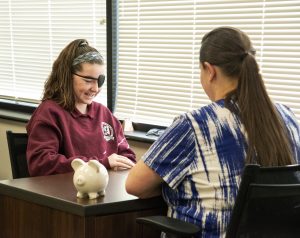An individualized program is critical for effective treatment.
 An individualized vision therapy program, combining both office and home-based vision therapy that address a patient’s specific visual problems, delivers the most efficient results.
An individualized vision therapy program, combining both office and home-based vision therapy that address a patient’s specific visual problems, delivers the most efficient results.
What does treatment include?
A typical Vision Therapy treatment program includes the following:
• Activities to build or improve visual skills.
Patients perform certain visual activities and procedures that will help correct the visual functioning of their eyes. These will be performed both in our office and at home. Newly acquired visual skills will be reinforced and made automatic through repetition and by integration with motor and cognitive skills.
• Office visits to build visual skills and keep patients on track.
For best and most efficient progress, regular visits to the office are required. There are many important visual activities are done in the office with a vision therapist that cannot be done at home. Proper performance of supportive home activities is also monitored. Office visits are generally 45 minutes in length. Many patients come weekly but frequency of the visits will depend on the diagnosis and severity of the problem.
• Use of various treatment devices.
The Vision Therapy Center uses a variety of treatment devices including, but not limited to, any of the following tools:
◦ Corrective lenses
◦ Therapeutic lenses
◦ Prism lenses
◦ Optical filters
◦ Brock strings
◦ Eye patches or occluders
◦ Vectograms, Tranaglyphs & Stereo objects
◦ Electronic targets with timing mechanisms
◦ Computer software
◦ Vestibular (balance) equipment
◦ Visual-motor-sensory integration training devices
How long will the program last?
The length of the treatment will vary, as will the exercises required. We will be building your visual-motor skills and endurance through the use of specialized computer and optical devices. Therapy programs can range in length from one session to 2-3 years. Most programs last between 8-12 months.
What about self-guided vision therapy programs?
In order for the therapy program to be effective, it must be directed by an expert in the field of developmental optometry. A person’s visual system is very complex, and only a doctor with the appropriate training is qualified to determine which techniques should be used for your vision problem.
Are glasses prescribed?
In some cases, prescription lenses may be required for certain refractive conditions. It is important to know that The Vision Therapy Center does not make glasses. We refer all of our patients to other optometrists and opticians.
A developmental optometrist’s approach to prescribing lenses is different than that taken by general optometrists or ophthalmologists. Our approach is functional and focuses on the underlying visual problem.
When we prescribe lenses, they may serve any of the following functions:
• Preventive lenses:
To prevent a vision problem from developing further.
• Development lenses:
To support developing visual skills and help cope with visual stress.
• Remedial lenses:
A temporary fix for a specific problem; designed to provide a stopgap measure until the therapy can be completed.